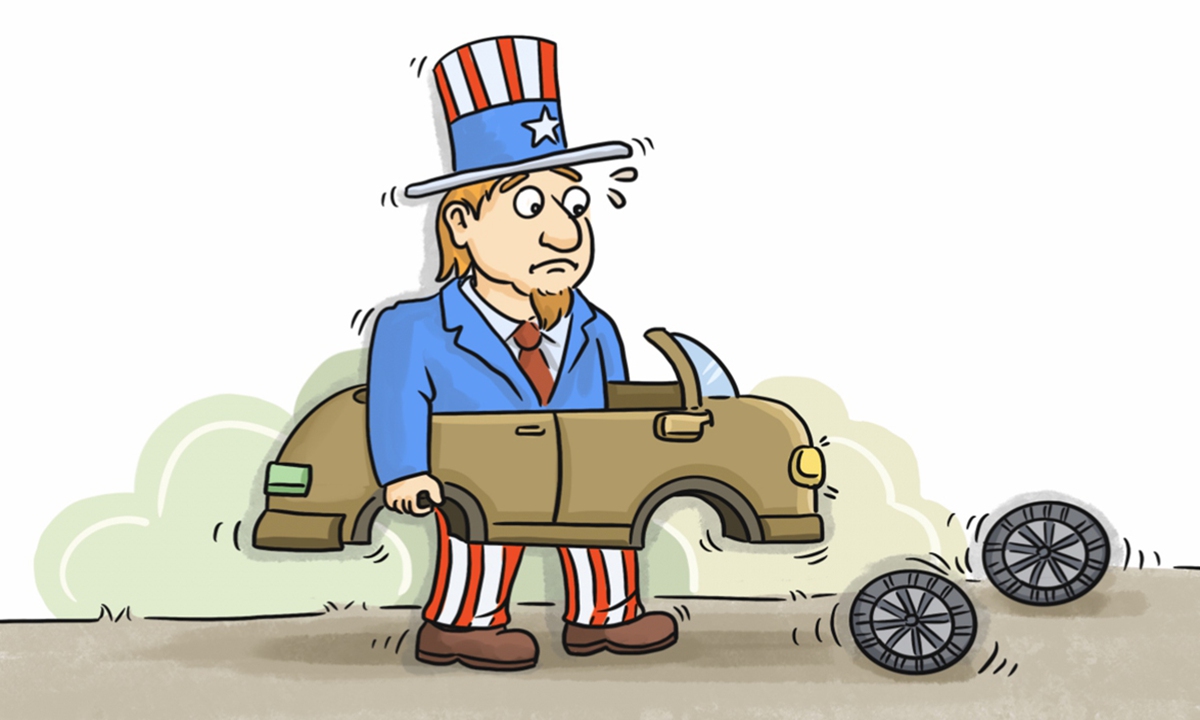
US infrastructure Illustration: Xia Qing/GT
US House lawmakers passed late Friday night the bipartisan $1.2 trillion infrastructure bill. US President Joe Biden called the vote a "monumental" step forward. He said the legislation would put the US "on a path to win the economic competition for the 21st century."
Nonetheless, the bill will by no means solve all the US' problems and give the country enough vitality to compete with China in the sphere of large-scale infrastructure projects. Most of US major infrastructure construction was driven by the private sector. Now the Biden administration is trying to take that over with an American-style "planned economy." This is a move trying to reengineer the dynamics of the US economy, using its weak spots to back one of the country's most daunting tasks. Thus, the chances that the plan will be effectively implemented are slim by any means.
Indeed, after the funding budget was shrunk greatly, 13 House Republicans voted for Biden's infrastructure bill. However, the bill was eventually passed with a narrow margin, as six Democrats joined the bulk of the Republicans in voting against the measure. This reflects that the bill is not highly comprehensively supported in the US. Meanwhile, Biden's other $1.75 trillion bill focusing on social services and climate change programs is yet to pass.
Some US infrastructure is outdated in comparison with China's. In fact, the two cannot really be compared. Most of China's infrastructure was built relatively recently, so it is normal that such projects are more advanced. China has a large population, which determines a higher use rate of infrastructure. So a boost in infrastructure can bring a relatively high return. For example, China's national conditions make the country a fertile ground for the rapid development of high-speed rail, and expressways are needed in most parts of China. The cost of such infrastructure is high, but it is justified by the needs of large local populations.
The US' sense of urgency comes largely from the comparison with China. Some US political elites arrogantly believe that the US should lead the world in all aspects for fear that China surpasses them in any way. They are lost in their pride and arrogance. It is the general trend in the globalized world that different regions tend to enjoy similar levels of development. Most of the US' problems, including its Cold War-like impulse to contain China, stem from the narrow-mindedness that the US cannot accept that others are good.
The US will never be able to build such a high-density railway network as China's and its total level of expressways will certainly fall behind China's. In the long run, the total carrying capacity, activity and economic value of its information network will hardly match that of China. Infrastructure in China is promoted under the guidance of government. This is adequate for China's actual conditions and a maximization of using China's resources. But if the US imitates China, the likely outcome is a disordered and feeble plan that does not fit the US' conditions and market needs. The expensive infrastructure programs in the US cannot bring about the return of new tax sources, and this will push the country into a false prosperity papered over by quantitative easing and excessive money-printing.
Since the outbreak of the COVID-19 pandemic, the US government has repeatedly proposed large-scale stimulus. The country with dollar hegemony has used its "endless money" to issue various kinds of subsidy. This has created a scenario where people can live on subsidy without going to work. As this becomes an attractive paradigm, the US has suffered from a port logjam, increasing shortages of truck drivers and a chaotic domestic supply chain. The US has advantages in technology and capital, but it has lost the most basic spirit of seeking truth from facts in politics, and its social ethic of hard work is constantly being disintegrated.
It is tantamount to a fairy tale to revitalize US competitiveness relying merely on a stimulus bill. The US has its advantages, but if it wants to be as competitive as China in some spheres, it should turn American people into people who are as diligent as Chinese and turn American officials into being as responsible and hard-working as their Chinese peers. China's blossoming infrastructure is the work of a whole society, and it is not something that American politicians can easily achieve by making unrealistic plans.




